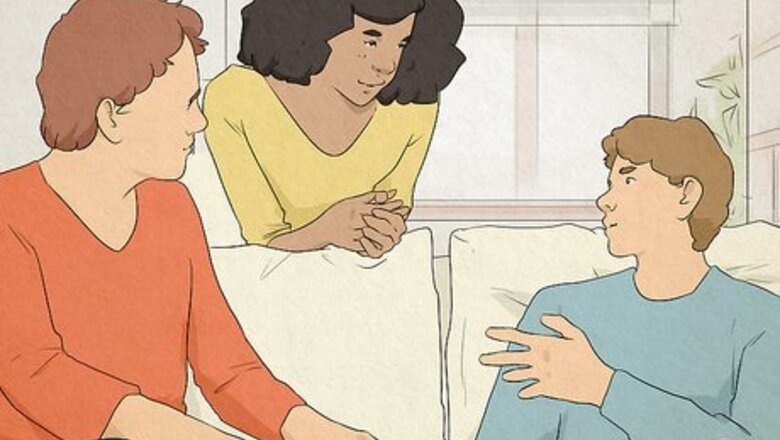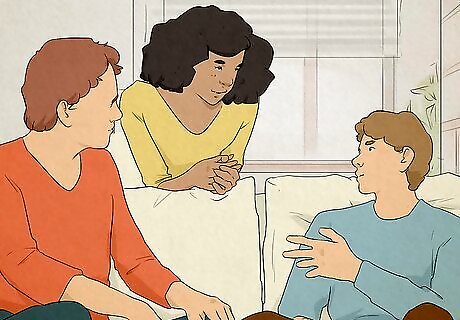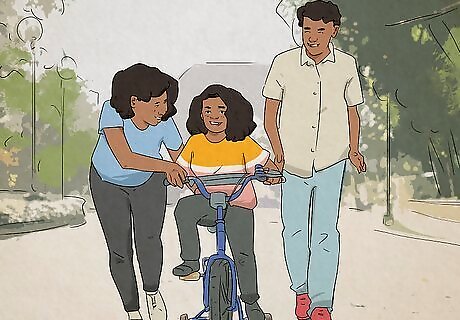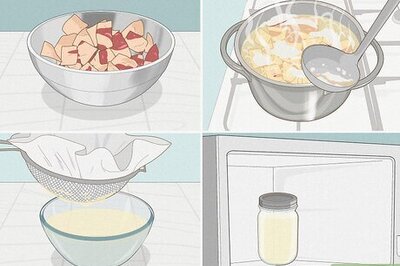
views
Popular Dutch Last Names

Popular Dutch names vary in meaning. Many of the most recognizable ones are based on a father’s first name, but they can also describe a person, where they live, or their occupation. De Jong is the most popular Dutch last name and is given to a younger son, or a son who is “junior.” Akkerman — “Farm belonging to Akker.” Berkenbosch — “Grove of birch trees” De Jong — “The young.” De Klerk — “Clerk.” Drees — Nickname of Andries, meaning “manly.” Hagen — “Hedge.” Hummel — “Busy as a bee.” Janssen — “Son of Jan.” Jonckers — “Young lord.” Kappel — “Person who works in a chapel.” Klein — “Little” or “small.” Kuiper — “Barrel repairman.” Langbroek — “Wide meadow.” Loman — “Meadow.” Meijer — “Landlord.” Rademaker — “Wheel maker.” Roosevelt — “Rose field.” Van Aalsburg — “Noble fortress.” Van Alphen — A town in the Netherlands. Van Der Beek — “From the creek.” Van Der Stoep — “From the paved entrance.” Van Der Veen — “Swamp” or “marsh.” Van Horn — “Someone who plays a horn.”
Common Dutch Last Names
These names represent the most common variation among Dutch surnames. They include traditional Dutch spellings of names that describe a particular place, like Leeuwenhoek, meaning “lion’s corner.” Many of them include the Dutch “van” prefix, which indicates “from” or “of.” Dutch last names with “van” are often used to reflect a person’s birthplace or heritage. Casparij — “Treasurer.” Colijn — “Victory of the people.” Cruyssen — “Cross.” Elzinga — “Alder tree.” Heeren — “Lord” or “gentleman.” Joosten — Short form of Joost. Leeuwenhoek — “Lion’s corner.” Offermans — “Offering” or “donation.” Oomen — “Maternal uncle.” Spiker — “Granary.” TerAvest — “At the edge.” Van Achteren — “From behind.” Van Aggelen — Named for the Egchel province. Van Amstel — “Water area.” Van As — “Ash tree.” Van Dalen — “From the valley.” Van Der Vliert — “From the elderberry.” Van Dijk — “From the dike.” Van Hassel — “Hazel tree.” Van Wegberg — “Way to the mountain.” Verhoeven — “Farm.” Vervloet — “From the stream.” Westenberg — “West of the mountain.”
Patronymic Dutch Last Names

Names based on lineage refer to a parent’s first name. For Dutch surnames, it’s traditionally the father’s name that patronymic last names use. For instance, Claasen means “son of Klaas,” while Segers means “son of Zieger.” Some last names are almost exactly like the name they refer to, including “Jaspers,” for “son of Jasper,” and Peters, for “son of Peter.” Aalfs — “Son of Aalf.” Claasen — “Son of Klaas.” Cornelissen — “Son of Cornelius.” Flipsen — “Son of Filip.” Fransen — “Son of Franz.” Goossens — “Son of Goswin.” Hendriks — “Son of Hendrik.” Jaspers — “Son of Jasper.” Jorritsma — “Jorrit’s son.” Leenders — “Son of Leendert.” Martens — “Son of Martin.” Meeuwsen — “Son of Meewus.” Otto — “Son of Odo.” Peters — “Son of Peter.” Prinsen — “Son of Prince.” Reichard — “Son of Reichard.” Segers — “Son of Zieger.” Stegenga — “Descendent of Steigunc.” Theunissen — “Son of Theunis.” Willemsen – “William's son.” Wilms — “Descendant of Wilhelm.” Yancy — “Son of Jan.”
Geographic Dutch Last Names
Locational last names mention or describe a place name. Many of these Dutch names mention actual regions or towns in the Netherlands, like Altena, Baardwijk, or Schoorl. Others mention something about the location itself, like “Eikenboom,” meaning “oak tree,” or Achterberg, meaning “behind a hill.” Some geographical names mention the owner of the land; one example is Abbingh, meaning “Abbe’s farm.” Aaldenberg — “Old mountain.” Aarle — “From the Netherlands.” Abbingh — “Abbe’s farm.” Abspoel — Name of an estate in South Holland. Achterberg — “Behind a hill.” Adrichem — “Adrik’s home.” Altena — A town in the Netherlands. Baardwijk — “From Baardwijk.” Bezuidenhout — “South forest.” Daalmans — “People living in a valley.” Dam — “Pond.” Eikenboom — “Oak tree.” Rietveld — “Reed field.” Roggeveen — “Rye field.” Romeijnders — “Person from Rome.” School — “Those who live near a school.” Schoorl — A town named Schoorl. Tisza — Name of a river in Hungary. Van Amelsvoort — “Ford of the Amer River.” Van Breda — “From Breda.” Van Donk — “Sandy hill.” Van Kan — “From Kanne, Belgium.”
Occupational Dutch Last Names

Occupations represent many of the meanings behind Dutch names. Some more popular jobs, like blacksmith, have a few last names, like Smit and the more uncommon Funck. Other surnames refer to a person’s title, like one of many B last names that include Baas, meaning “boss,” or “De Keizer,” meaning “the emperor,” and date back to medieval names used in the Middle Ages. Baas — “Boss” or “master.” Bakker — “Baker.” Beenhouwer – “Butcher.” Bouwmeester — “Architect.” Coeman — “Merchant.” De Jaager — “The hunter.” De Keizer — “The emperor.” Dekker — “Thatcher.” Drukker — “Printer.” Hoedemaker — “Hat maker.” Houtkooper — “Wood trader.” Koning — “King.” Mesman — “Knife maker.” Nagel — “Nail.” Slootmaekers — “Locksmiths.” Smit — “Blacksmiths.” Spijker — “Nailsmith.” Teuling – “Toll taker.” Timmerman – “Carpenter.” Ververs — “Painter.” Visser — “Fisher.” Waterman — “Ferryman.”
Descriptive Dutch Last Names
Many names describe a place, a thing, or a person. Some better-known ones include Vogel, meaning “bird,” and “De Haas,” meaning “hare.” More random selections, like Borst, for “chest,” or Ruisch, for the “sound of wind and water,” vary. Both Bos and Holst refer to the “woods” or “forest.” Alderliesten — “Most dearest.” Boelen — “Bold.” Boogaard — “From the orchard.” Borst — “Chest.” Bos — “Woods.” De Groot — “The tall or great.” De Haas — “Hare.” De Wees — “Orphan.” De Windt — “The wind.” De Witt — “The blond.” De Wolfswinkel — “Wolf’s store.” Franck — “Free man.” Groff — “Boorish man.” Haak — “Hook.” Holst — “Forest.” Muyskens — “Little mouse.” Ruisch — “Sound of wind or water.” Van der Molen — “From the mill.” Van der bijl — “From the axe.” Vinke — “Little bird.” Vogel — “Bird.” Vroom — “Pious.”
Unique Dutch Last Names

These names stand out with particular or detailed meanings. Their categories vary, but between Roosa, meaning “rose,” and Ryskamp, meaning “camp,” Dutch names prove that they can be either pretty or cool. Nature-related names include Beekhof, for “garden brook,” and Braam, for “blackberry.” Anholts — “To hold for some time.” Beekhof — “Garden brook.” Braam — “Blackberry.” Dijkstra — “From the road.” Fortuin — “Fortune.” Funck — “Blacksmith.” Geels — “Son of Gailo.” Kikkert — “Frog.” Mulder — “Miller.” Peerenboom — “Pear tree.” Roosa — “Rose.” Ryskamp — “Camp.” Strom — “Stream.” Van Laar — “Open spot in a forest.” Van Middelburg — “Middle fortress.” Van Rompaey — “Wide path.” Van Valkenburg — “Castle of the falcons.” Van Zijl — “From the waterway.” Van der Heide — “From the heath.” Van der Verstappen — “From the steps.” Verboom — “From the tree.” Zaal — “Hall.”
Uncommon Dutch Last Names
The following names range from uncommon to rare. Some aren’t seen very often, like Kneynsberg, used to describe a place called “rabbit’s hill.” Others include unusual or funny surnames, like Gekkenhuis, meaning an “insane asylum,” or Naaktgeboren, meaning “born naked.” The longest among them is Vandroogenbroeck, given to someone who comes “from the dry marsh.” Aakster — “Magpie.” Anker — “Anchor.” De Quant — “The prankster.” Gekkenhuis — “Insane asylum.” Gerbrandy — “Of Gerbrancy Tower.” Kneynsberg — “Rabbit hill.” Naaktgeboren — “Born naked.” Nouwen — “New settlements.” Paardebek — “Horse’s mouth.” Poepjes — “Little poos.” Scheefnek — “Crooked neck.” Schenk — “Wine server.” Schertzinger — “From Schertzinger.” Suikerbuik — “Sugar belly.” Van Draak — “From dragon.” Van Zutphen — “From Zutphen.” Van der Vuurst – “From the Vuursche.” Vandroogenbroeck — “From the dry marsh.” Vrooman — “Wise man.” Westhuizen — “From the houses in the west.” Zelle — “Cell.” Zonderkop — “Headless.”
Frisian Dutch Last Names
Frisian names are primarily used by Frisians living in Friesland. Frisians are a Germanic ethnic group living in the Dutch province of Friesland who have a distinct culture and identity. Their names are often slightly different variations of Dutch surnames, like Dykstra, instead of Dijkstra. Agema — “Son of Age.” Alkema — “Son of Alk.” Alma — “Son of Ale.” Alserda — “From Alserd farm.” Anema — “Son of Ane.” Anjema — “From Anjum.” Aukema — “Son of Auk.” Baarda — “From Baard.” Baarsma — “From Beers.” Bakema — “Son of Bake.” Barwegen — “Road to the dike.” Bootsma — “Boatsman.” Bouma — “Land worker.” De Vries — “Someone from Friesland.” Dykstra — “Dike.” Fries — “Frisian.” Herrema — “Lord” or “master.” Laninga — “Land.” Nicolai — “Son of Nicolas.” Reinders — “Son of Reinhardt.” Terpstra — “Lives on a terp.” Van Wieren — “From Weiren.”
Origin of Dutch Last Names

Dutch last names are mainly based on parentage, geography, and occupation. Last names became standard in the Netherlands in 1811, when the ruling emperor Napoleon required that all Dutch people register their surnames. At that time, citizens either named themselves after their occupation, where they lived, or their father’s name. Others took names that describe certain traits or personal characteristics. Prefixes, including "van," "de," and "van der," became a very common way to recognize Dutch surnames. They indicate where someone is “of” or “from.”



















Comments
0 comment